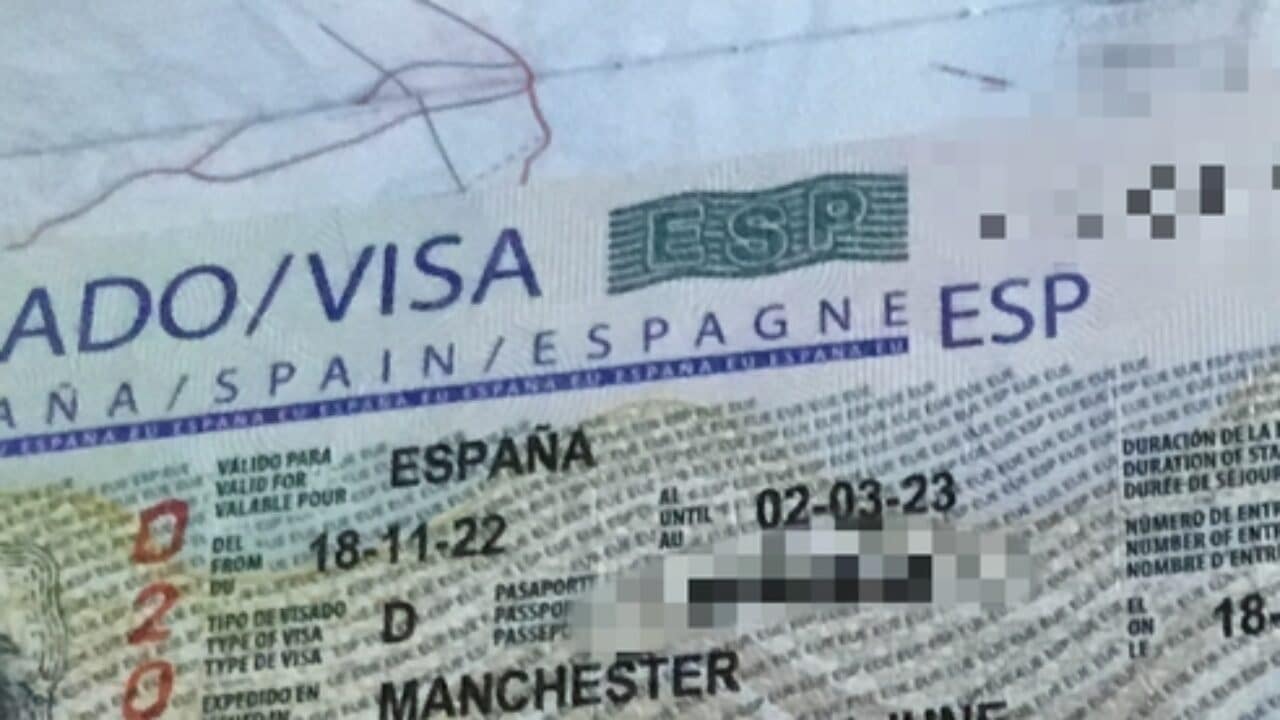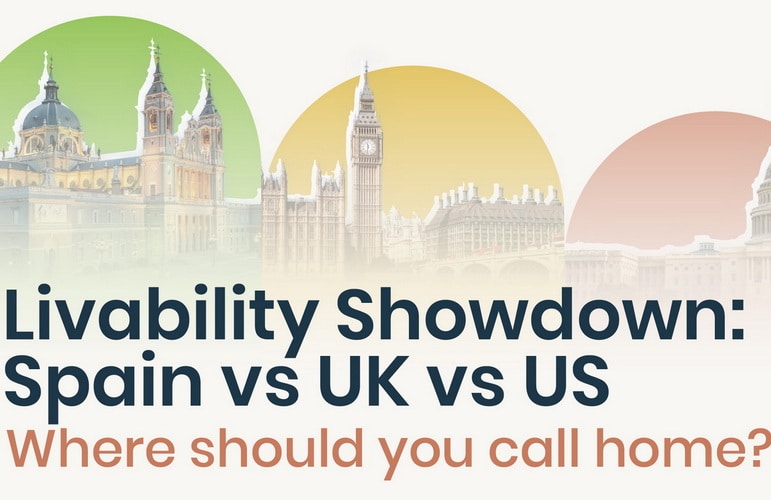There are several Spain visa types for short visits and long-term immigration. Read on to find the perfect immigration option for a holiday, visit, or long-term move. These visa options are for citizens of all non-EU / EEA countries, including American and British citizens. All 90+ day visas require private health insurance and a Spain residence permit.
| Spain Visa Type | < 90 days | > 90 days | Work in Spain | Health Insurance |
| SCHENGEN Visa | ✅ | ❌ | ❌ | ❌ |
| Non-Lucrative Visa | ❌ | ✅ | ❌ | ✅ |
| Digital Nomad Visa | ❌ | ✅ | Restricted | ✅ |
| Golden Visa | ❌ | ✅ | ✅ | ✅ |
| Study Visa | ❌ | ✅ | Restricted | ✅ |
| Job Seeker Visa | ❌ | ✅ | Restricted | ✅ |
| Working Holiday Visa | ❌ | ✅ | Restricted | ✅ |
| Entrepreneur Visa | ❌ | ✅ | ✅ | ✅ |
| Skilled Professional Visa | ❌ | ✅ | ✅ | ✅ |
| Spain Work Permit | ❌ | ✅ | ✅ | ✅ |
Remember: European Union (EU) and European Economic Area (EEA) citizens can freely travel to Spain without a visa. There is a registration process for EU/EEA citizens moving to Spain, but no visa is required.
READ ALSO: Residency in Spain for EU Citizens >> 2 Steps + Easy Shortcut
How to Stay In Spain Longer than 90 Days
Long-Stay Spain Visa Types (> 90 days)
Spain has several long-stay visa types if you want to move to Spain. Some allow work, while others do not. Many are a pathway to Spanish permanent residence (PR) and Spanish citizenship by naturalization.
If you want to fast-track your visa research and planning, book a consultation with our Spanish immigration lawyer partner. They are experts in this area and will help you choose the perfect option and submit a successful application.
Important: Private Health Insurance
All the visas below require an approved private health insurance policy that meets the Spain immigration requirements. You can get easy quotes from three excellent companies approved by the immigration department here >> Spain Private Health Insurance Quotes.
Non-Lucrative Visa (Spain retirement visa)
- Best for: Retirees to Spain and people with a passive income of at least €28,800 annually.
- Duration: Initial visa 1 year, with indefinite 2-year renewals.
- Requirements and application process: Spain Non-Lucrative Visa Guide.
Digital Nomad Visa
- Best for: International remote workers, consultants, freelancers, and digital nomads.
- Duration: Initial visa 1 year, with indefinite 2-year renewals.
- Requirements and application process: Spain Digital Nomad Visa Guide.
Golden Visa / Investment Visa
- Best for: Those looking to invest in the Spanish economy. This includes anyone planning to buy a home in Spain for over €500,000.
- Duration: Initial visa 1 year, with indefinite 2-year renewals.
- Requirements and application process: Spain Golden Visa Guide.
Entrepreneur Visa / Autónomo
- Best for: People looking to start a business in Spain.
- Duration: Initial visa 1 year, renewable for 4 additional years.
- Requirements and application process: Spain Work Permit Guide.
Highly Skilled Professional Visa
- Best for: Senior professionals with a qualifying job offer.
- Duration: Initial visa 2 years, renewable.
- Requirements and application process: Spain Work Permit Guide.
Spain Work Permit
- Best for: Employees with a qualifying job offer from a Spanish company.
- Duration: Initial visa 1 year, with indefinite 2-year renewals.
- Requirements and application process: Spain Work Permit Guide.
Study Visa
- Best for: International students accepted for a qualifying course of study in Spain.
- Duration: The duration of the course of study.
- Requirements and application process: Spain Student Visa Guide.
Job Search Visa / Post-Study Work Visa
- Best for: Students who have completed a qualified course of study in Spain and are looking for work in Spain.
- Duration: 1 year.
- More Information: This visa is not a work permit; it is a bridging visa that allows you to qualify for a residence permit.
Working Holiday Visa
- Best for: Young adult Citizens of Australia, Canada, Japan, New Zealand, and South Korea aged from 18 – 30 or 35.
- Duration: 1 year.
- More Information: You can work for six out of the twelve months.
Do You Need a Visa to Stay in Spain for Six Months?
Yes, non-EU/EEA citizens need a long-stay visa to live in Spain for six months (as it exceeds the 90/180-day rule). There are several options. You could use a six-month student visa for an appropriate length of study. Alternatively, you can use a Spanish visa type like the non-lucrative or digital nomad and leave Spain after six months.

Short-Stay Spain Visa Types (Less than 90 days)
Visa-exempt countries. Citizens of many countries can travel to Spain for up to 90 days without a visa. These countries include the United States (USA), the United Kingdom (UK), Australia, and New Zealand. See here for the full list of visa-exempt countries.
Spain SCHENGEN Visa Types (Type C Spanish Visa)
The SCHENGEN visa allows you 90 days within the SCHENGEN area. There are 8 Type C options:
- Spanish Transit Visa – transit through a Spanish airport with a final destination outside the Schengen Area.
- Spanish Tourist Visa – holidays or sightseeing.
- Spanish Visitor Visa – visiting friends or family living in Spain.
- Spanish Business Visa – business activities in Spain.
- Spanish Visa for Official Visit – government official travel.
- Spanish Medical Visa – authorized medical treatment in Spain.
- Spanish Study Visa – short-term courses of up to three months.
- Spanish Visa for Cultural, Sports, and Film Crews – work related to a qualifying field.
Spain SCHENGEN Visa application process
Where to apply: You’ll apply at your home country’s nearest Spanish consulate or embassy. Check the local embassy website for details.
Documents required: You’ll need your passport, proof of accommodation and funds, a return ticket, and health insurance. For options 3 – 8 above, you’ll need invitations, bookings, acceptance letters or similar supporting documentation.
All documentation should be included with your completed application form.
Need help with your Spain visa?
Our Immigration Partners, Raquel and her team, offer our clients a 30-minute consultation. They will recommend the best visa path for you, explain all the steps involved, and answer any questions that you have.
Fees for Spain Visa Types and Residency Permits
You’ll need to pay a fee for a visa, work permit, or residence permit. The cost varies depending on the permission type and your nationality. Unfortunately, US citizens moving to Spain are charged higher rates than other nationalities due to a reciprocal agreement between governments.
| Fee for USA citizens | Fee for other nationalities | |||
| Visa type | USD | EUR | GBP | USD |
| Student Visa | $155 | €80 | £69 | $88 |
| Employed Work Visa | $183 | €80 | £69 | $88 |
| Residency (Non-Lucrative) | $135 | €80 | £69 | $88 |
| Family Reunion | $135 | €80 | £69 | $88 |
| Work Visa | $135 | €80 | £69 | $88 |
| Religious Activities | $135 | €80 | £69 | $88 |
| Self-Employed Work Visa | $261 | €80 | £69 | $88 |
| New Entrepreneurial Law 14/2013 | $183 | €80 | £69 | $88 |
Visa vs. Residence Permit
These two terms can be confusing and are sometimes used interchangeably. In short, a visa allows you to enter Spain and clear immigration at the border. There are many types of Spain visas to choose from.
Then, your residence permit allows you to stay in Spain legally. Check out our guide to Spanish residency and residence permits for more information.
Spanish Permanent Residency (PR)
After legally living in Spain for 5 years, you can qualify for Spanish Permanent Residency (PR) and stay in Spain. Once you have PR, you can legally work in Spain, regardless of the type of visa you originally used to enter Spain.
Will any Health Insurance Meet the Requirements?
The government is very strict about healthcare coverage that qualifies for Spanish immigration applications. There are four key criteria:
- Fully comprehensive with no co-payment.
- No waiting period, so the policy offers full cover from the date of your arrival in Spain.
- From an authorized insurance company in Spain.
- There are no excluded pre-existing conditions.
Read more in our guide to private health insurance in Spain.
Spain Visa Types > How to Choose?
Each Spanish immigration option gives you different rights and has different requirements. To get started, check out the detailed guides using the links in the article. Or, you can chat with our brilliant Spanish Immigration law partner firm. They’ll listen to you and help you pick the perfect Spain visa types for you and your family.
FAQ – Spain Visa Types
What are the types of Spanish visas?
There are two main types of Spanish visas. Type C is a short-stay visa for less than 90 days, and Type D visas are for stays of more than 90 days.
Can I get a long-term visa for Spain?
Many long-term Spanish visa types cover retirees, employees, remote workers, investors, students, young people, digital nomads, and the self-employed.
What is Spain visa type C?
The Type C visa is a short-stay SCHENGEN visa for visits of less than 90 days.
What is a category D visa in Spain?
Category D visas are for long-term residency in Spain. These include the non-lucrative visa, digital nomad visa, golden visa, and Spanish work visas.
What Is The 90-180 Schengen visa rule?
You can stay a maximum of 90 days in the SCHENGEN area in any 180-day period.
Do I need valid health insurance when traveling to Spain?
Yes, you’ll need valid qualifying health insurance to cover the duration of your time in Spain. Travel insurance is good for a Type C short-stay, but you’ll need Spanish private health cover for a long-stay visa.
Can I get a visa to stay in Spain for 6 months?
Yes, you can apply for a student visa for a six-month course of study. Alternatively, you can use options like the non-lucrative visa or digital nomad visa and leave Spain after six months.









How long can Australian citizen stay in Spain
Hi Robert. With a standard SCHENGEN vistor’s visa you can spend up to 90 days in Spain. To stay longer than that, you’ll need to apply for a long-term visa (https://movingtospain.com/immigration/visas/) or residence permit. Regards, Alastair
I’m a British Citizen looking to migrate to Spain; I’m completely confused about which Visa would best suit my situation.
Hi Elle-Marie – if our guide to visas hasn’t helped you to narrow down your options, I’d suggest a call with our immigration lawyer partners. Raquel and her team have years of experience helping British citizens move to Spain – they’ll be best placed to guide you to the perfect solution. All the best, Alastair https://movingtospain.com/services/spain-immigration-lawyer/
Hello. I am an American citizen that is interested in retiring and moving to Spain permanently. In looking at the visas it would appear that the non lucrative visa would be what I would want but unfortunately i am about $3,000.00 a year short of the requirement. I am wondering if these are hard/unwavering figures and if so, what should I be looking at alternatively? Thanks!
Hi James. The Spanish immigration service wants to know that you can support yourself while living in Spain. So, they’ll want to see income or savings that meet the minimum cost-of-living standard. You’ll have difficulty getting visa approval without savings to offset your income gap. Check our NLV guide for more information. All the best, Alastair
If you get a long term non-lucrative visa for Spain, are you still restricted to 90 days in the other Schengen countries?
Hi Rhonda. Yes, your Spanish residency visa allows you to live in Spain, but you are still legally restricted to 90 /180 days in other SCHENGEN countries. In reality, there are few cross-border checks within the region. So, as long as you maintain a residence in Spain for the entire period, there is little record of your 90-day limit. All the best, Alastair
My husband and I are Americans looking to move to Spain to start a family. He owns a motorcycle business and I am completing my master’s in Social Work to pursue therapy. What is the best visa for this and how accessible would a job be for me to obtain with my credentials?
Hi Danielle. The Autonomo self-employed visa would work if your husband is starting his own business. To assess your opportunities, I’d suggest contacting Expat Therapists in Spain. Find websites, join Facebook groups, use LinkedIn, etc. You’ll be able to get up-to-date and specific information on opportunities and challenges from them. All the best, Alatsair
Hey, I’m an US citizen thinking of moving to spain, and applying for the digital nomad visa when i’m older, but i’m curious how spain will tax whatever remote work i do in spain, and if there are any well known remote jobs or professions that can make me at least 80 grand pre tax a year. Anyways, my main question is, say if i apply and attain citizenship in a country like paraguay, will I get the benefits of potentially being naturalized in two-years since it’s an latin american country, even if i wasn’t born in the country and secretly only got the citizenship to increase my chances of getting citizenship in two years of residency?
Hi Bernard. 1) Check out our Spain Expat tax guide – you’ll see that once you are a Spanish tax resident, you’ll pay Spansih tax on global income, but programs like the Beckham law can considerably lower your tax bill. 2) If you are a citizen of one of the Ibro-American countries, you only need two years of residency in Spain to qualify for Spanish citizenship by naturalization. Regards, Alastair
Under NLV, how many days am I required to be in ES? I’m a US based cabin crew and will need to exit ES weekly to go to work in the USA.. Is this even possible?
Hi Jose. Officially, you should not be working on a Spain NLV and should spend 183 days per year in Spain. There are some special dispensations where you can show that your time outside Spain is unavoidable and incidental to Spain still being your home (and your job may be one of these exceptions). All the best, Alatsauir
I am a US citizen and wamt to stay in Spain for 2 months to work on my Spanish. I don’t have that much vacation, so I’d like to take my company PC (US company) so I can work for part of that time. Is this allowed with no visa since it’s a short term stay?
If not, would it be allowed if I enrolled in a school and got a student visa?
Hi Natalie. The strict letter of the law says you should have immigration permission that allows you to work in Spain. However, as your stay is for only 60 days and well within the duration of your tourist visa, there is very little chance your expressed wish to improve your Spanish while on holiday will be interrogated. If you have accommodation booked and clear evidence of sufficient funds to cover your expenses during your stay, there shouldn’t be an issue. Nowadays, people commonly carry a laptop to keep in touch and do some work while on vacation. All the best, Alastair
My wife is a dual Spanish/U.S. citizen and I am a U.S. citizen. We plan on retiring to her (our) flat in Spain at the end of this year. Our marriage is already registered in Spain and we have our updated “family book” from the Spanish Government. What type of Visa do I need to get? Thanks!!
Hi Stacey. Good news – I just received confirmation from our immigration lawyer partner. ” * The US spouse doesn’t need a residency visa to enter Spain – they can enter on a standard SCHENGEN 90-day tourist visa. * They need to apply for 5-year residence permit and TIE in Spain, they can do that once they arrive in Spain.” Regards, Alastair
Thank you!!
Hello
My husband and I are in the process of purchasing a home in Sitges we put about 400k down, I understand golden visa ask for 500k. Would we still have a chance at qualifying or can you recommend another visa or residency so we can enjoy our new home. My husband is a physician fr US and licensing process to get him recognized in Spain is book worthy and I am retired but I am certified in teaching English. Any advice would be great.
Hi Tippy. I’d recommend speaking with our immigration lawyer partner, as they’ll look at your entire situation and find the best possible immigration option for you and your husband. All the best, Alastair
Hi, I have dual Spanish/UK nationality as well as my son but my husband is British. We are planning on moving to Mallorca at the end of the year and wanted to know what visa my husband would have to get?
Thanks.
Hi Elisa. Your (lucky) husband can enter as the spouse of a Spanish citizen and register as a resident in Spain without requiring a visa. All the best, Alastair
I have a small travel business in the USA, and would like to move and establish that business to ES. Which visa would be the best for me to pursue?
Hi Susan. The Autonomo self-employed visa or Digital Nomd visa may both be options. I’d suggest you meet with our immigration lawyer partner to asses which would be best in your situation. All the best, Alastair
I work on location in the US and as well remotely, I want to move my family to Spain under a long term visa program and hire a legal team to help me with the process. My question is if I arrive in Spain on a tourist visa to get the paperwork started for a digital nomad visa or a self employed visa can I return for work in the US for short periods and leave my family there in Spain am I allowed to come in and out for work before the process is finished or am I required to stay in Spain for the entire process? I understand that I need to be in Spain at minimum 181 days
Hi Darrell. You should be able to come and go from Spain, and there is a provision to apply for a digital nomad visa while in Spain on a tourist visa. The Spanish Immigration department must respond to your application within 20 days – the 183-day requirement is once you take up residency through your visa. I’d suggest meeting with our immigration lawyer partner to manage the process smoothly and to ensure you meet the requirements. All the best, Alastair
The company I work for is headquartered in Spain. Is the Digital Nomad visa the one I would select to be able to fly in for work for a few days (maybe a week at a time) maybe 2 or 3 times a year, and would I need to re-apply each time or just for the one VISA valid for 1 year? I am based in South Africa
Hi Gemma – as you are not aiming to live in Spain and your visits are short-term for your exisiting employer then a standard SCHENGEN (Type C Spanish Visa) Business should be appropriate. All the best, Alastair https://www.exteriores.gob.es/Embajadas/pretoria/en/ServiciosConsulares/Paginas/Consular/Visados-Schengen.aspx
Hi, I wanted to move to Andorra to do religious activities. Their residency being too expensive, I considered moving into northern Spain, from where I could drive into Andorra for religious activities.
Someone recommended that I get a religious activities visa to do so, but I doubted as to whether a religious activities visa would permit me to conduct religious activities in Andorra. I have to wonder what the requirements for having a religious activities visa in Spain are, and if they would leave room for religious activities in Andorra.
And, lastly, if a religious activities visa will not permit me to conduct such in Andorra, is there a visa that would?
Any info regarding would be helpful.
Thank you!
Hi Mark – given the complexity of your requirements, I’d suggest meeting with a good Spanish immigration lawyer for clarity. All the best, Alastair
Thanks so much Alastair
My kids (24 and 21 years old) and I would like to live in Spain. We are Filipino-Americans with 2 passports. What would be your recommendations on how to go over obtaining Permanent Residency for the 3 of us, possible the quickest and the easiest. Thank you.
Hi Orlando. You’ll need to live in Spain for five years using an appropriate visa or residence permit. After that, you can apply for permanent residency in Spain. You can check out our Residency in Spain Guide for more information. All the best, Alastair
My wife and I are retired and can qualify for a non-lucrative visa. However, we would want to include my daughter and her family (4 total). She is currently working full-time in the United States, a job that would be terminated for the move. For her to work in Spain, utilizing her education and experience, is the golden visa her only option? If we buy a house jointly valued over the golden visa minimum requirement, would that qualify?
Thank you.
Hi Cliff. Depending on your daughter’s skills, experience, and employment prospects, she could qualify for one of the Spanish work visas, a digital nomad visa, or a golden visa, which would allow her to work in Spain or remotely. To qualify for the golden visa, your daughter must contribute at least €500,000 towards the property purchase as a primary applicant – but note that the Spanish government has announced the intention to close the golden visa program. However, the legislation may take some time to pass. I’d suggest you chat with our immigration lawyer partners – with the complete picture; they may have other options for you to consider. All the best, Alastair
Thanks for you prompt response!
Hi, I am a US citizen about 8 years out from retiring and would like to move to Spain for my golden years. Is there anything I need to do now to prepare myself for the move? If not, how far in advance do you recommend I start planning. Thank you for your assistance.
Hi Jodi. I wouldn’t advise doing anything formal, as policies can change over eight years. I would recommend visiting Spain several times to find the places you love and to start learning Spanish so you can hit the ground running. Checking the cost of living and ensuring your finances cover your planned lifestyle is also a good idea. Still, economies and currencies will change considerably over the next eight years, so a broad impression of these areas will be sufficient. Around two years out, you can dive into identifying visas, qualifying for health insurance, and starting a detailed financial planning process to maximize your wealth. All the best, Alastair
Hi Alastair, there is great info in your checklist and on these pages and it’s helping us to narrow in on our options. But one thing that. that we need some more information on before we proceed and take further action is about the golden Visa, One of the Visa options we are considering.
We have read and been told that if you are not married in community of property, then we may need to each invest €500,000 in property. We were married in South Africa by anti-nuptual contract. Is there a mechanism by which we can still limit the investment to a total of €500,000? Thanks for your help!
Hi George – I asked the advice of our immigriaotn lawyer and this is possible – her reponse was “If not married under community property regime, only one of the spouses should be the buyer and the other will qualify as a family member.” All the best, Alastair
Is it possible to apply for a digital nomad and/or skilled worker visa while in Spain? I’m finding conflicting answers… but I know many countries don’t allow for one to apply for certain visas while in country.
HI Misty. Yes, you can apply for the Digital Nomad Visa while in Spain – our immigraotn lawyer can assit with your application. https://movingtospain.com/services/spain-immigration-lawyer/ All the best, Alastair